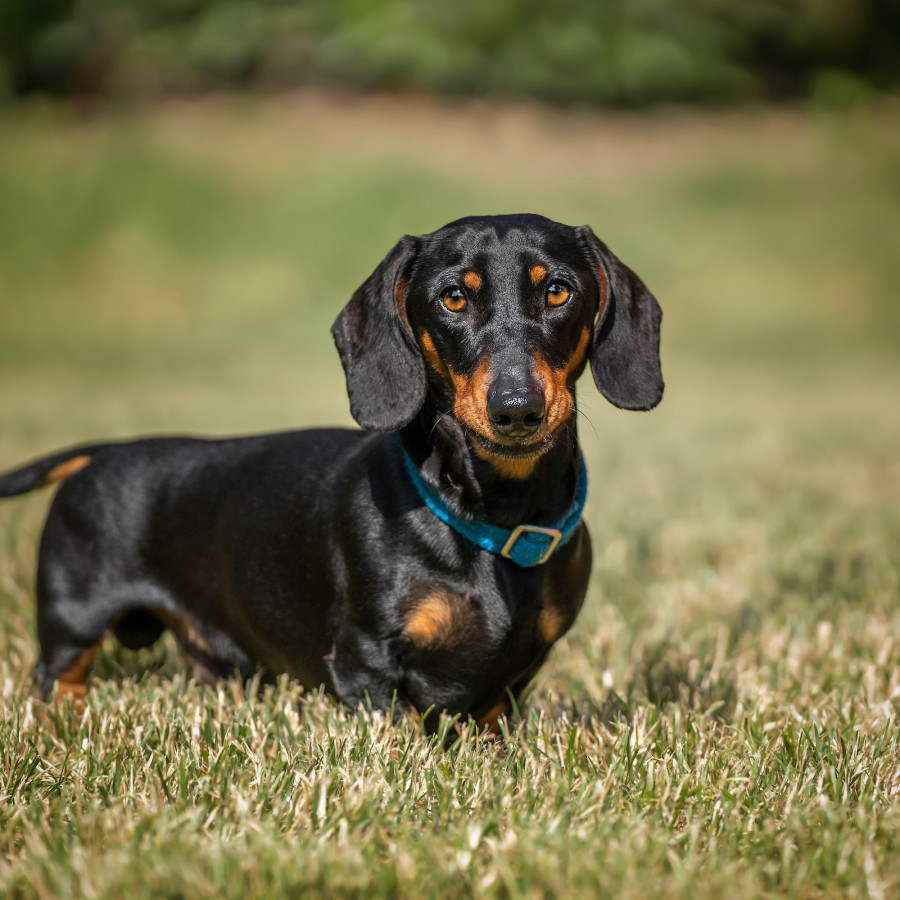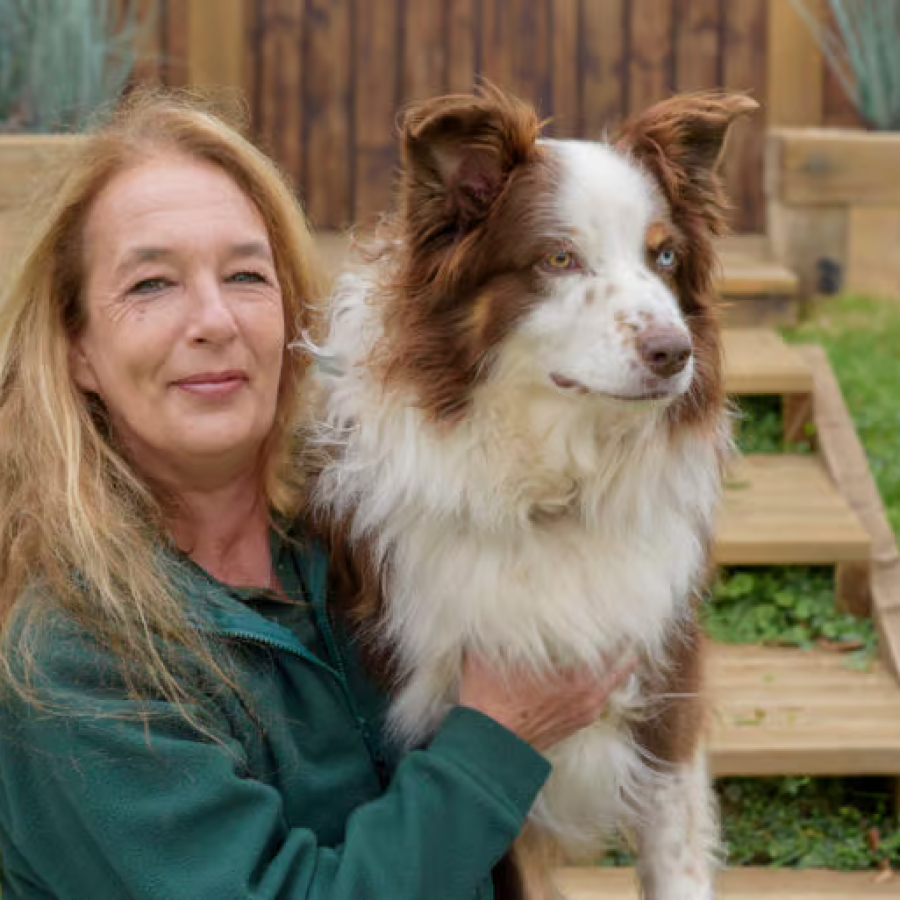
Dachshund Dog Breed
Dachshunds are little bundles of energy. They’re fun, lovable and incredibly loyal.

Dachshunds are little bundles of energy. They’re fun, lovable and incredibly loyal.
Breeds like this may have extreme body conformation, which means exaggerated body features, or a flat face and shorter nose (brachycephalic). These characteristics can negatively affect their health and welfare, and you may face higher insurance and veterinary costs.
If you have your heart set on this breed, please consider rescuing a dog in need rather than buying a puppy.
Dachshunds are lively, curious, and cheeky little dogs with a big personality. They love to play and explore which can often get them into mischief! The best type of home for the breed is a fun but relaxed one with owners who can spend lots of time with them.
Dachshunds are known for their playful and sparkling personality. They’re intelligent and curious dogs that are always ready for an adventure. Their loyal and affectionate nature makes them great canine companions. As well as this, they’re quite strong-willed and like to do things their own way (even if you disagree!) You’ll often find them chatting away, whining or barking to let you know what they’re thinking.
These little dogs thrive in the company of their owners and love being the centre of attention in the family. Because of this, they tend to struggle on their own. They were bred to be hunting dogs, so despite their sausage-like looks, they’re no couch potatoes. Dachshunds love being active and using their brains to learn new things – especially if they can do it with you.
Disclaimer
While these breed traits give a general idea of what to expect from a specific type of dog, it's important to remember that every dog is unique. Just like people, each dog comes with their own distinct personality, quirks, and characteristics!

Due to their size and playful, affectionate nature, Dachshunds make excellent family pets. They’re quite sassy and snappy if playtime gets out of hand, so they’re best suited with older children. With their boundless energy and love for attention, they’re great little dogs for someone looking for a forever friend to spend time playing, training and exercising with. Like all dogs, it’s important to always watch Dachshunds around children to prevent any accidents or inappropriate interactions.
Dachshunds need to be carefully introduced to other pets and strangers to ensure they get along in the future. They’re a cautious breed, especially around things they’re unsure of or haven't seen before. Not only this, but they also tend to be possessive of their favourite humans, snacks, and toys. They benefit from starting training early, including spending time around people and dogs. This will help to build their confidence and understand what’s safe and normal.
Dachshunds are very playful and full of energy! They love games that copy what they were bred to do, which is to hunt animals in burrows. So, think sniffing, chasing, digging and tugging: any game that involves this, they’ll be all over it.
Their idea of a great time involves running in nature, following scent trails, and exploring, ending the day with a good game of tug-of-war. Toys that challenge their minds, like puzzle feeders or interactive toys, are also a great way to keep them busy.
Dachshunds are known to burrow in blankets, which is very cute! But if they don’t get the chance to show their natural born behaviours, they may take it upon themselves to landscape your garden for you (think digging up your flowerbeds) or re-lay your flooring, aka, digging a hole in the carpet!
Dachshunds are naturally startled by noises and movement, so they’ll be quick to let you know about it by barking. You’ll often find them looking out of windows or listening at the front door for any signs of activity.
If they think they’ve seen or heard something interesting, they’ll likely bark excessively. Who needs a doorbell when you have a Dachshund? However, they tend to develop this habit of continuous barking if they’re not trained from an early age. They need to learn the difference between real threats and normal, everyday occurrences.
The best home for a Dachshund is one with a secure garden space for plenty of exploring and playing.
Providing they have plenty of playtime and opportunities to be taken out, Dachshunds can live in flats or apartments. Just keep your neighbours in mind when they go on a barking spree!
Some suggest that Dachshunds shouldn’t use stairs or be allowed to jump on and off furniture as it can damage their long backs. However, appropriate exercise and staying active will help your dog build muscle and prevent injuries. Always check with your vet about how to keep your Dachshund safe if they have previously been diagnosed with any spinal issues.
Dachshunds can live with other dogs and pets if they’ve met at a young age, alongside positive training and experiences to learn how to get along. However, they need more care and training than other breeds to be safe around small pets.
For physical exercise, miniature Dachshunds need around 20-30 minutes and a standard size needs 40-60 minutes every day. Their daily activities should amount to more than this to keep them content, relaxed, and out of trouble!
Their ideal exercise routine should include a mix of:
- Sniff-focused walks in natural spaces – somewhere safe and secure for them to explore and run.
- Playing in the garden with a designated digging area and lots of chasing and tug of war.
- Mental exercise involving food search games to sniff out their meal and interactive puzzle feeders instead of a boring old bowl.
The right amount of food and physical exercise is especially important to prevent weight gain, which can increase a Dachshund’s risk of back problems such as intervertebral disc disease.
All puppies need to learn how to be around people, pets, and other dogs, calmly and politely (known as socialisation). They also need help to feel calm, comfortable, and confident in everyday situations like travelling, the sound of traffic, and being in busy places (known as habituation). This is essential to prevent tricky behavioural problems in the future, and you'll be off to a great start with your ongoing training.
Dachshunds can be moderately challenging to train, as they were bred to work independently to hunt game underground. This means they need extra time to learn new skills, as well as patience and positivity.
All puppies require reward-based training and should learn basic behaviours, as well as how to interact with other dogs, animals, and people. Without this, they can become anxious or develop rude behaviour which can be hard to manage. You might have to spend longer training them when they’re older. As dogs mature, they go through several life stages that can change their behaviour. This will mean you need to focus on certain aspects of training.
Common Dachshund issues to look out for are, barking, digging, resource guarding, separation anxiety and reactivity.
Dachshunds are prone to several health conditions, including:
Intervertebral Disc Disease (IVDD): This is the most common health problem in Dachshunds. They’re more likely to need treatment for spinal disc problems than other dogs. If your dog has IVDD already, avoid activities that put a strain on their back, like jumping from heights.
Obesity: Dachshunds are prone to weight gain, which can worsen IVDD and other health issues.
Dental Disease: Dachshunds are over 50% more likely to need treatment for dental issues than other dogs, leading to bad breath, tooth loss, and infections. Regular dental check-ups and home dental care, like brushing their teeth and providing dental chews, can help maintain oral health.
Patellar Luxation: This is a condition where the kneecap dislocates which can cause pain and lameness.
Gastrointestinal issues: Dachshunds are likely to have sensitive stomachs. Your vet can help you identify the cause if you think your dog has one.
Don’t let my little legs fool you! I need lots of exercise for my brain and body to keep me healthy and happy. Without it, I might get up to mischief.
I may be small, but I have a pretty big brain! Interactive toys, training sessions, and games keep me an entertained, happy pup!
I have an attention-seeking and mischievous streak, so I need consistent training to learn to stay calm and quiet. You’ll find me at my happiest when exploring new places together!
A Dachshund costs £800 to £1,500, not including the additional cost of basic everyday items like toys, a bed, bowls, lead and collars, which can cost up to £250. Then you have grooming supplies as well as ongoing expenses including regular vet bills, insurance, training, additional courses, dog walkers for if you can’t get out yourself and boarding fees for getaways.
Take our quiz to discover which breed is right for you
Take our quizPlease call our pet support line on 0300 303 9333 (7 days a week – 8.30am - 4pm)